Microeconomics Assignment - WOU: Supply, Demand, and Cost Analysis
VerifiedAdded on 2022/09/18
|8
|789
|29
Homework Assignment
AI Summary
This microeconomics assignment solution addresses key economic concepts, including opportunity cost, market equilibrium, and elasticity. The assignment analyzes the decision-making process of enrolling in a distance learning program, applying the theory of choices and opportunity cost to determine the best alternative. It further explores market equilibrium, calculating revenue and analyzing shifts in supply and demand curves due to changes in factors like wheat demand, mozzarella prices, hamburger health concerns, and tomato sauce prices. The solution also calculates and interprets the price elasticity of demand for Milo and the cross-price elasticity between Milo and Ovaltine, providing insights into consumer behavior and product relationships. The document provides relevant figures and references to support the analysis.
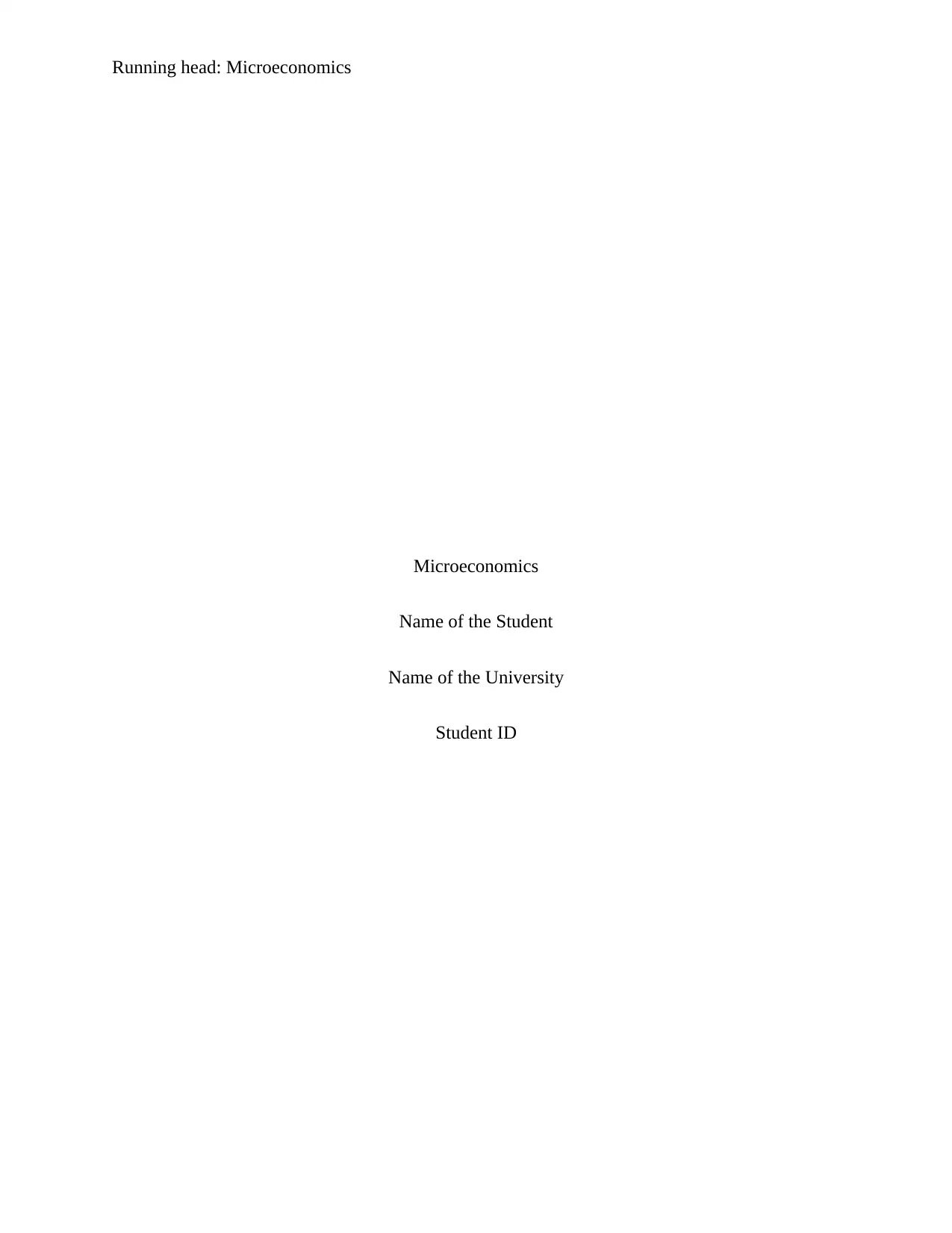
Running head: Microeconomics
Microeconomics
Name of the Student
Name of the University
Student ID
Microeconomics
Name of the Student
Name of the University
Student ID
Paraphrase This Document
Need a fresh take? Get an instant paraphrase of this document with our AI Paraphraser
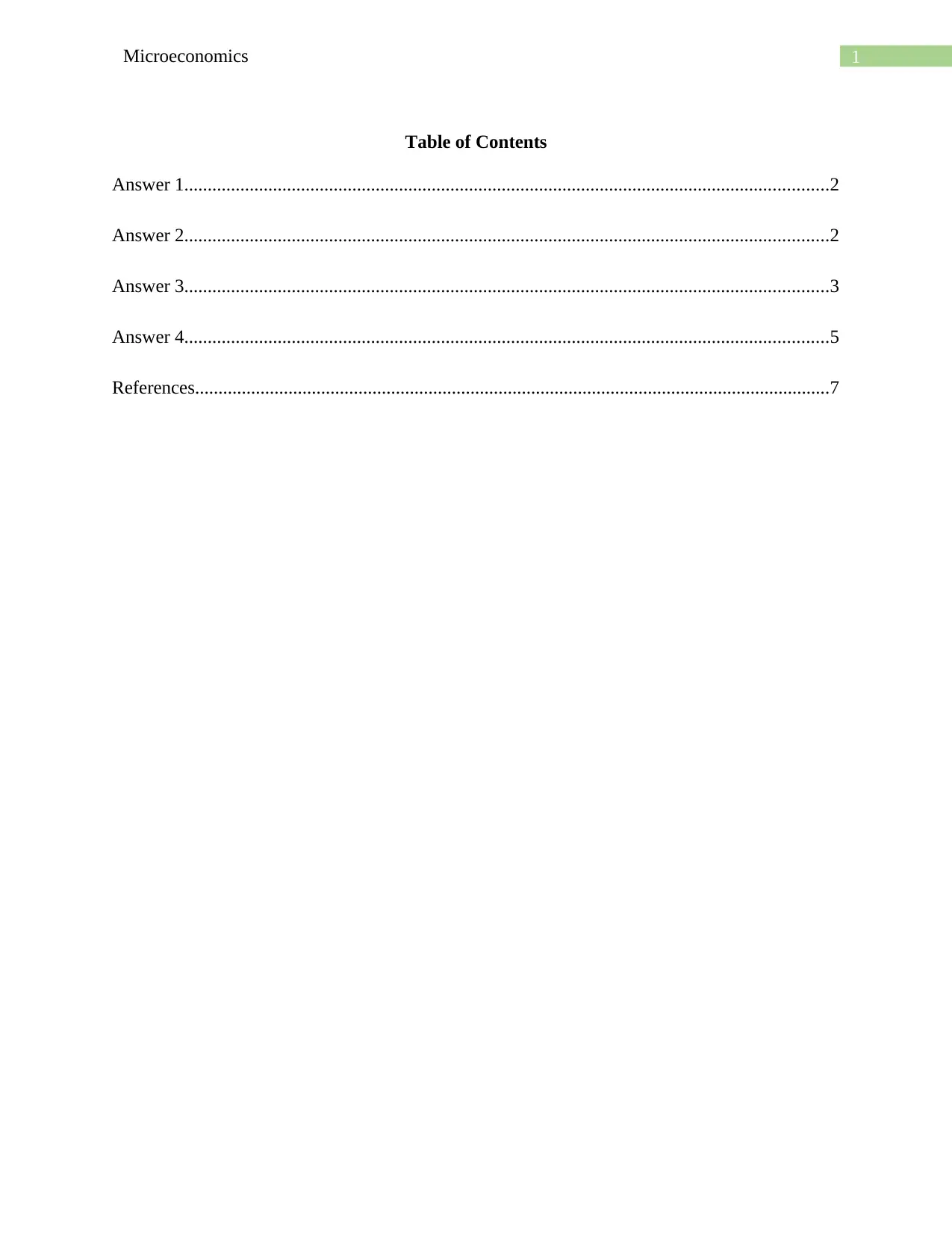
1Microeconomics
Table of Contents
Answer 1..........................................................................................................................................2
Answer 2..........................................................................................................................................2
Answer 3..........................................................................................................................................3
Answer 4..........................................................................................................................................5
References........................................................................................................................................7
Table of Contents
Answer 1..........................................................................................................................................2
Answer 2..........................................................................................................................................2
Answer 3..........................................................................................................................................3
Answer 4..........................................................................................................................................5
References........................................................................................................................................7
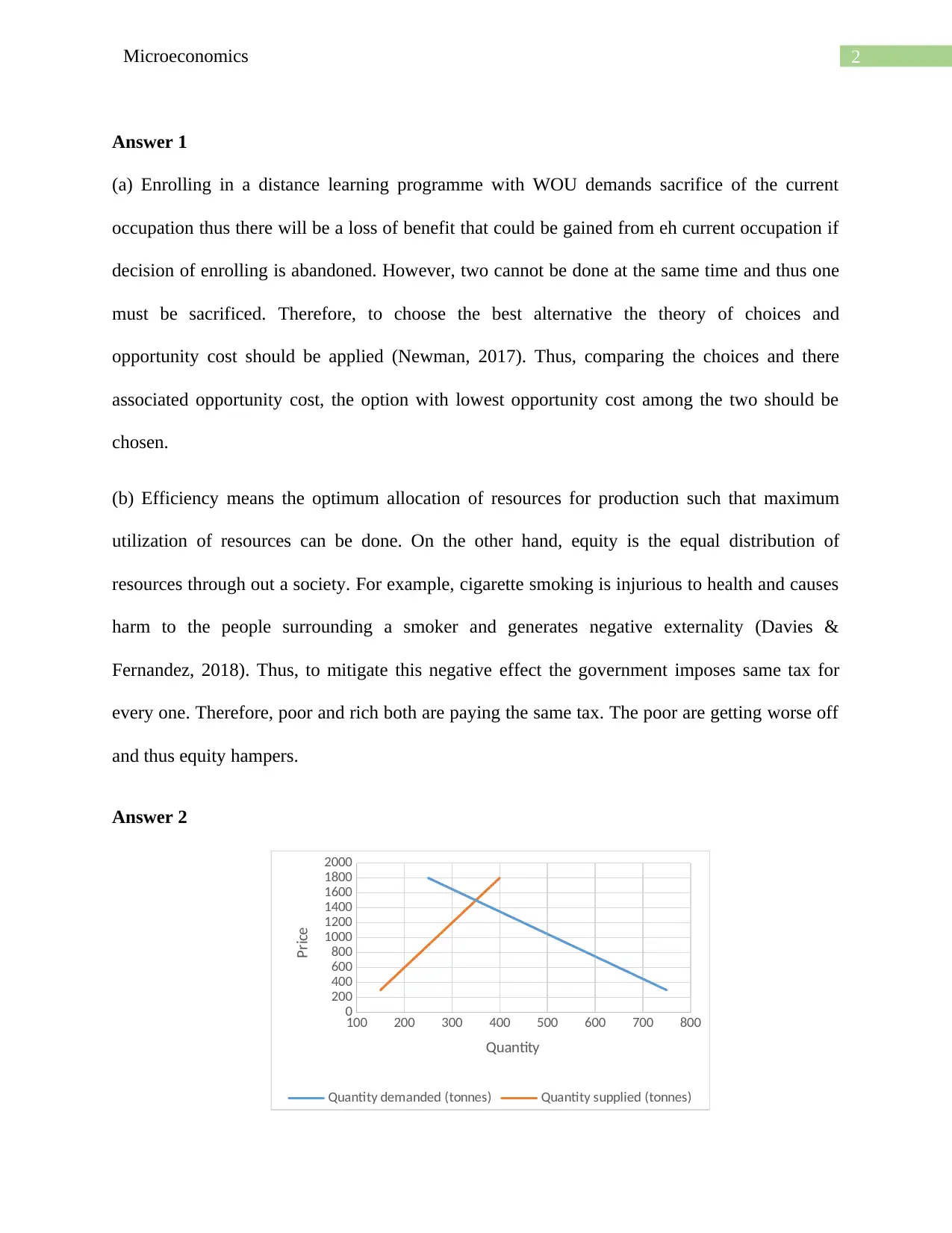
2Microeconomics
Answer 1
(a) Enrolling in a distance learning programme with WOU demands sacrifice of the current
occupation thus there will be a loss of benefit that could be gained from eh current occupation if
decision of enrolling is abandoned. However, two cannot be done at the same time and thus one
must be sacrificed. Therefore, to choose the best alternative the theory of choices and
opportunity cost should be applied (Newman, 2017). Thus, comparing the choices and there
associated opportunity cost, the option with lowest opportunity cost among the two should be
chosen.
(b) Efficiency means the optimum allocation of resources for production such that maximum
utilization of resources can be done. On the other hand, equity is the equal distribution of
resources through out a society. For example, cigarette smoking is injurious to health and causes
harm to the people surrounding a smoker and generates negative externality (Davies &
Fernandez, 2018). Thus, to mitigate this negative effect the government imposes same tax for
every one. Therefore, poor and rich both are paying the same tax. The poor are getting worse off
and thus equity hampers.
Answer 2
100 200 300 400 500 600 700 800
0
200
400
600
800
1000
1200
1400
1600
1800
2000
Quantity demanded (tonnes) Quantity supplied (tonnes)
Quantity
Price
Answer 1
(a) Enrolling in a distance learning programme with WOU demands sacrifice of the current
occupation thus there will be a loss of benefit that could be gained from eh current occupation if
decision of enrolling is abandoned. However, two cannot be done at the same time and thus one
must be sacrificed. Therefore, to choose the best alternative the theory of choices and
opportunity cost should be applied (Newman, 2017). Thus, comparing the choices and there
associated opportunity cost, the option with lowest opportunity cost among the two should be
chosen.
(b) Efficiency means the optimum allocation of resources for production such that maximum
utilization of resources can be done. On the other hand, equity is the equal distribution of
resources through out a society. For example, cigarette smoking is injurious to health and causes
harm to the people surrounding a smoker and generates negative externality (Davies &
Fernandez, 2018). Thus, to mitigate this negative effect the government imposes same tax for
every one. Therefore, poor and rich both are paying the same tax. The poor are getting worse off
and thus equity hampers.
Answer 2
100 200 300 400 500 600 700 800
0
200
400
600
800
1000
1200
1400
1600
1800
2000
Quantity demanded (tonnes) Quantity supplied (tonnes)
Quantity
Price
⊘ This is a preview!⊘
Do you want full access?
Subscribe today to unlock all pages.

Trusted by 1+ million students worldwide
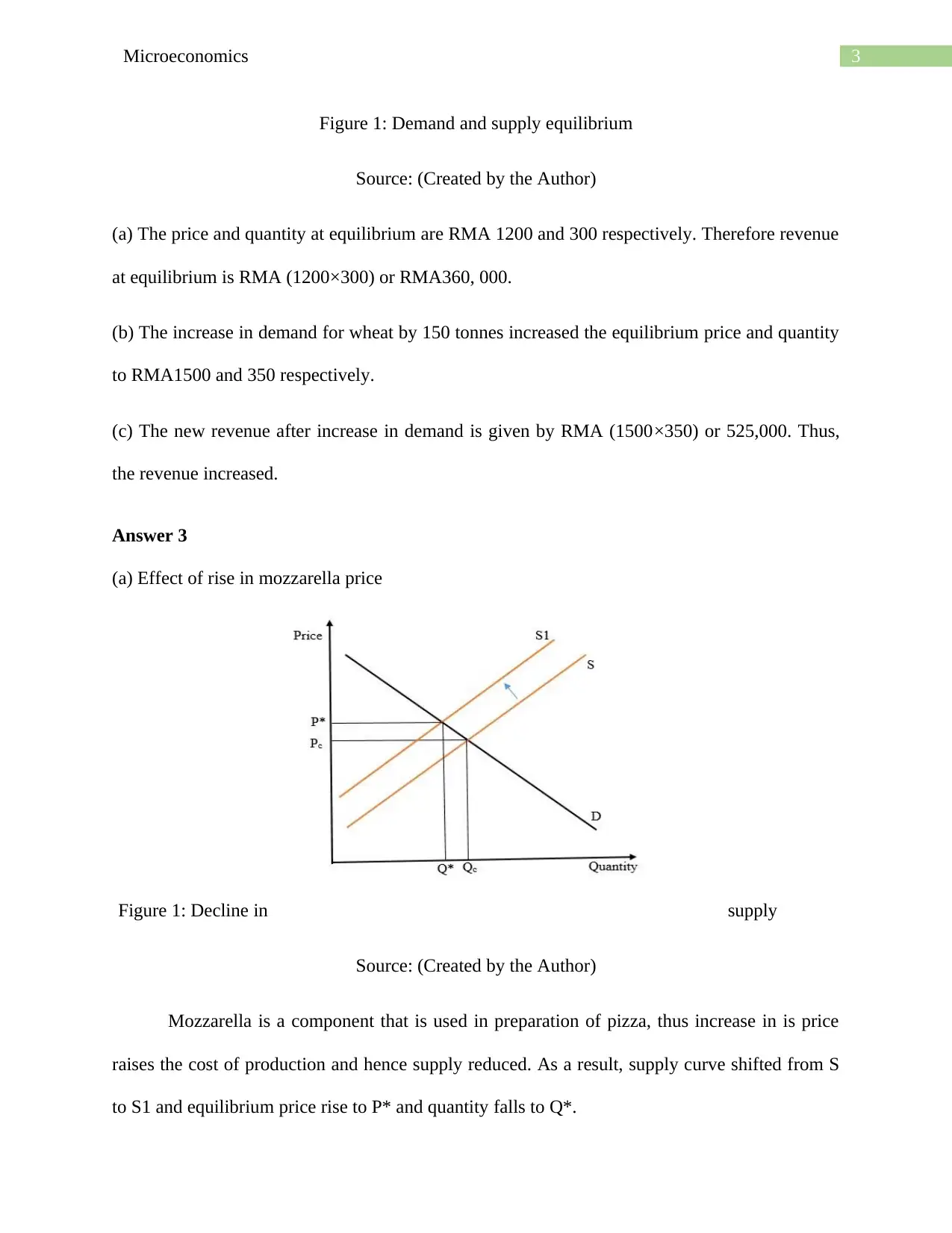
3Microeconomics
Figure 1: Demand and supply equilibrium
Source: (Created by the Author)
(a) The price and quantity at equilibrium are RMA 1200 and 300 respectively. Therefore revenue
at equilibrium is RMA (1200×300) or RMA360, 000.
(b) The increase in demand for wheat by 150 tonnes increased the equilibrium price and quantity
to RMA1500 and 350 respectively.
(c) The new revenue after increase in demand is given by RMA (1500×350) or 525,000. Thus,
the revenue increased.
Answer 3
(a) Effect of rise in mozzarella price
Figure 1: Decline in supply
Source: (Created by the Author)
Mozzarella is a component that is used in preparation of pizza, thus increase in is price
raises the cost of production and hence supply reduced. As a result, supply curve shifted from S
to S1 and equilibrium price rise to P* and quantity falls to Q*.
Figure 1: Demand and supply equilibrium
Source: (Created by the Author)
(a) The price and quantity at equilibrium are RMA 1200 and 300 respectively. Therefore revenue
at equilibrium is RMA (1200×300) or RMA360, 000.
(b) The increase in demand for wheat by 150 tonnes increased the equilibrium price and quantity
to RMA1500 and 350 respectively.
(c) The new revenue after increase in demand is given by RMA (1500×350) or 525,000. Thus,
the revenue increased.
Answer 3
(a) Effect of rise in mozzarella price
Figure 1: Decline in supply
Source: (Created by the Author)
Mozzarella is a component that is used in preparation of pizza, thus increase in is price
raises the cost of production and hence supply reduced. As a result, supply curve shifted from S
to S1 and equilibrium price rise to P* and quantity falls to Q*.
Paraphrase This Document
Need a fresh take? Get an instant paraphrase of this document with our AI Paraphraser
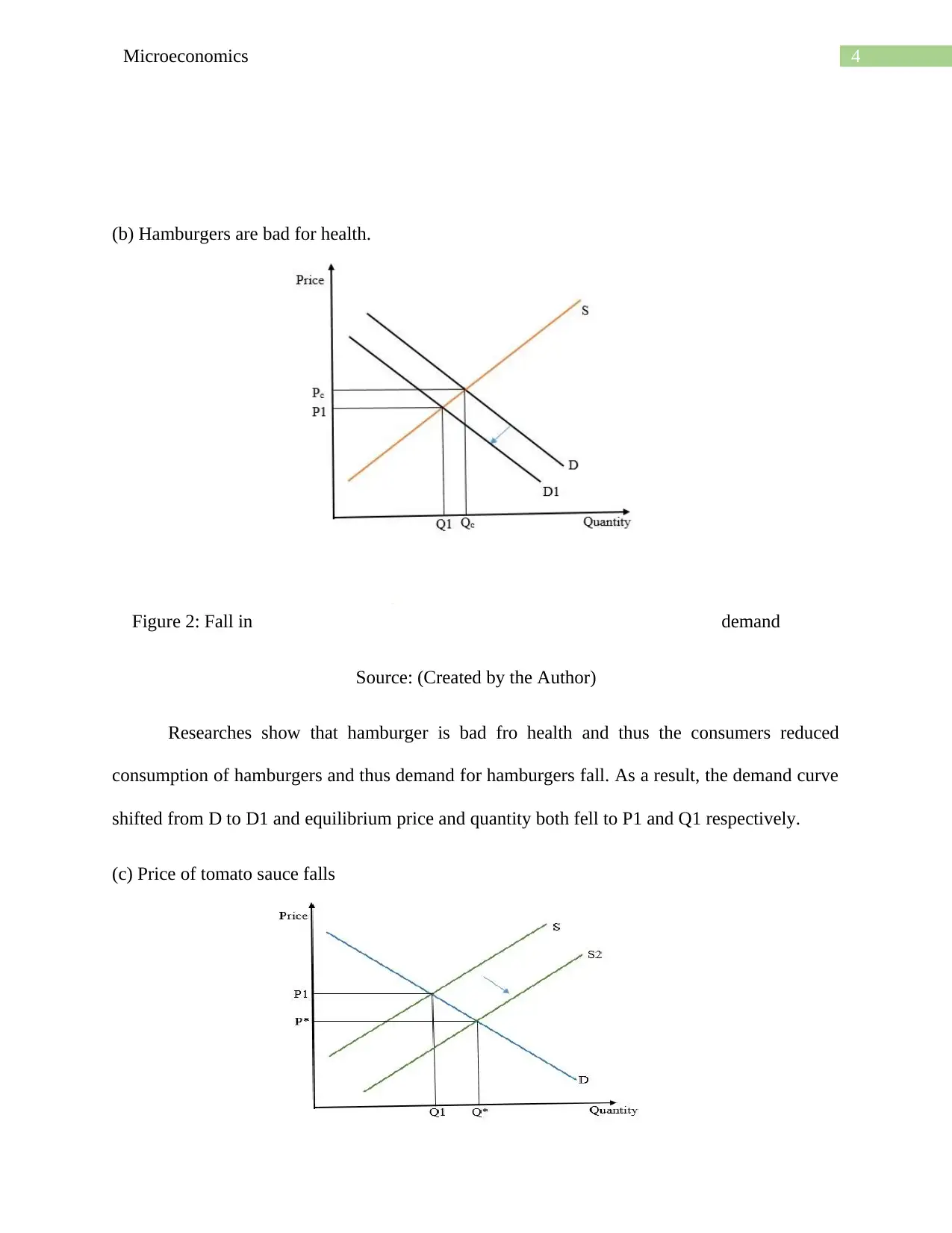
4Microeconomics
(b) Hamburgers are bad for health.
Figure 2: Fall in demand
Source: (Created by the Author)
Researches show that hamburger is bad fro health and thus the consumers reduced
consumption of hamburgers and thus demand for hamburgers fall. As a result, the demand curve
shifted from D to D1 and equilibrium price and quantity both fell to P1 and Q1 respectively.
(c) Price of tomato sauce falls
(b) Hamburgers are bad for health.
Figure 2: Fall in demand
Source: (Created by the Author)
Researches show that hamburger is bad fro health and thus the consumers reduced
consumption of hamburgers and thus demand for hamburgers fall. As a result, the demand curve
shifted from D to D1 and equilibrium price and quantity both fell to P1 and Q1 respectively.
(c) Price of tomato sauce falls
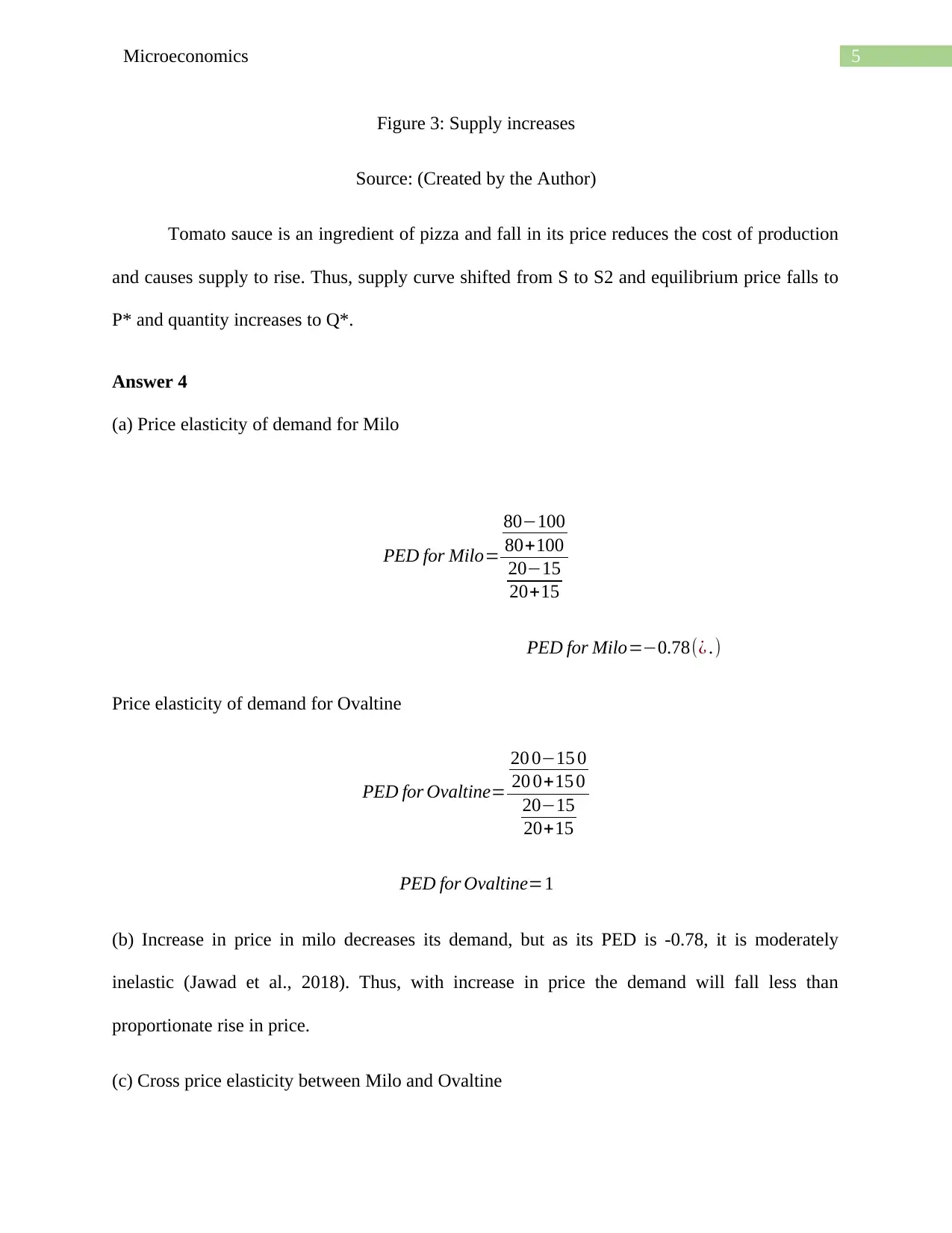
5Microeconomics
Figure 3: Supply increases
Source: (Created by the Author)
Tomato sauce is an ingredient of pizza and fall in its price reduces the cost of production
and causes supply to rise. Thus, supply curve shifted from S to S2 and equilibrium price falls to
P* and quantity increases to Q*.
Answer 4
(a) Price elasticity of demand for Milo
PED for Milo=
80−100
80+100
20−15
20+15
PED for Milo=−0.78(¿ .)
Price elasticity of demand for Ovaltine
PED for Ovaltine=
20 0−15 0
20 0+15 0
20−15
20+15
PED for Ovaltine=1
(b) Increase in price in milo decreases its demand, but as its PED is -0.78, it is moderately
inelastic (Jawad et al., 2018). Thus, with increase in price the demand will fall less than
proportionate rise in price.
(c) Cross price elasticity between Milo and Ovaltine
Figure 3: Supply increases
Source: (Created by the Author)
Tomato sauce is an ingredient of pizza and fall in its price reduces the cost of production
and causes supply to rise. Thus, supply curve shifted from S to S2 and equilibrium price falls to
P* and quantity increases to Q*.
Answer 4
(a) Price elasticity of demand for Milo
PED for Milo=
80−100
80+100
20−15
20+15
PED for Milo=−0.78(¿ .)
Price elasticity of demand for Ovaltine
PED for Ovaltine=
20 0−15 0
20 0+15 0
20−15
20+15
PED for Ovaltine=1
(b) Increase in price in milo decreases its demand, but as its PED is -0.78, it is moderately
inelastic (Jawad et al., 2018). Thus, with increase in price the demand will fall less than
proportionate rise in price.
(c) Cross price elasticity between Milo and Ovaltine
⊘ This is a preview!⊘
Do you want full access?
Subscribe today to unlock all pages.

Trusted by 1+ million students worldwide
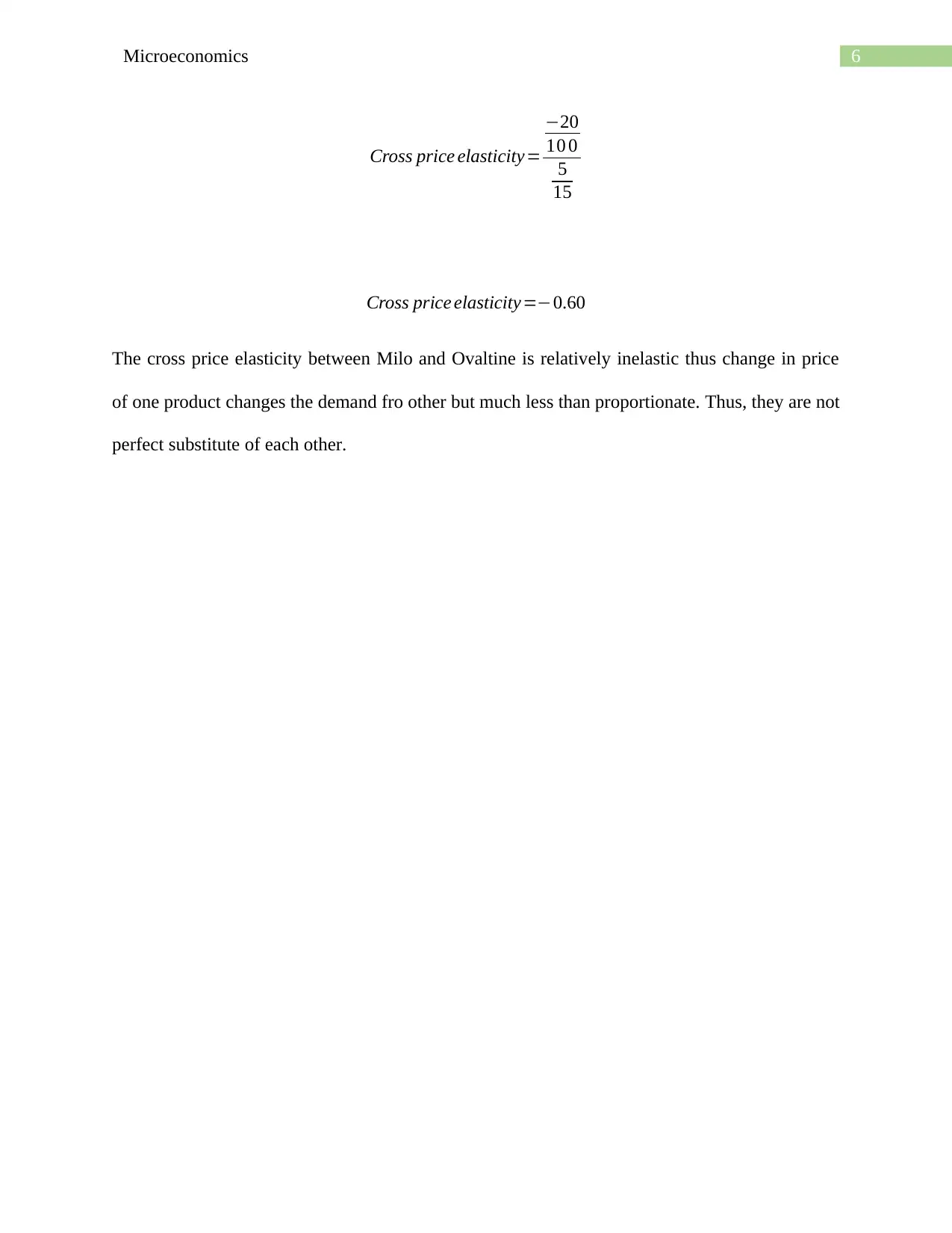
6Microeconomics
Cross price elasticity=
−20
10 0
5
15
Cross price elasticity=−0.60
The cross price elasticity between Milo and Ovaltine is relatively inelastic thus change in price
of one product changes the demand fro other but much less than proportionate. Thus, they are not
perfect substitute of each other.
Cross price elasticity=
−20
10 0
5
15
Cross price elasticity=−0.60
The cross price elasticity between Milo and Ovaltine is relatively inelastic thus change in price
of one product changes the demand fro other but much less than proportionate. Thus, they are not
perfect substitute of each other.
Paraphrase This Document
Need a fresh take? Get an instant paraphrase of this document with our AI Paraphraser
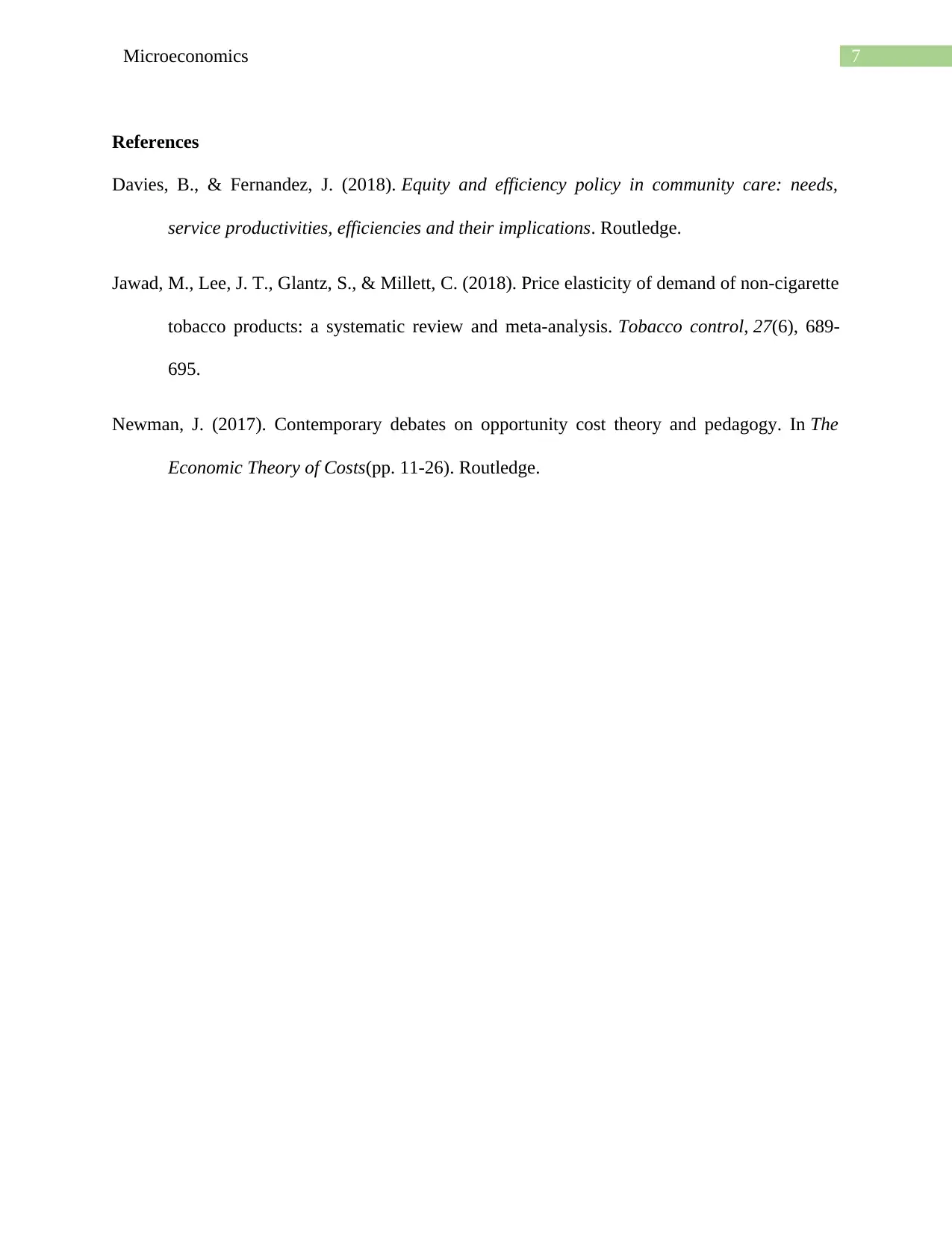
7Microeconomics
References
Davies, B., & Fernandez, J. (2018). Equity and efficiency policy in community care: needs,
service productivities, efficiencies and their implications. Routledge.
Jawad, M., Lee, J. T., Glantz, S., & Millett, C. (2018). Price elasticity of demand of non-cigarette
tobacco products: a systematic review and meta-analysis. Tobacco control, 27(6), 689-
695.
Newman, J. (2017). Contemporary debates on opportunity cost theory and pedagogy. In The
Economic Theory of Costs(pp. 11-26). Routledge.
References
Davies, B., & Fernandez, J. (2018). Equity and efficiency policy in community care: needs,
service productivities, efficiencies and their implications. Routledge.
Jawad, M., Lee, J. T., Glantz, S., & Millett, C. (2018). Price elasticity of demand of non-cigarette
tobacco products: a systematic review and meta-analysis. Tobacco control, 27(6), 689-
695.
Newman, J. (2017). Contemporary debates on opportunity cost theory and pedagogy. In The
Economic Theory of Costs(pp. 11-26). Routledge.
1 out of 8
Related Documents
Your All-in-One AI-Powered Toolkit for Academic Success.
+13062052269
info@desklib.com
Available 24*7 on WhatsApp / Email
![[object Object]](/_next/static/media/star-bottom.7253800d.svg)
Unlock your academic potential
Copyright © 2020–2026 A2Z Services. All Rights Reserved. Developed and managed by ZUCOL.





